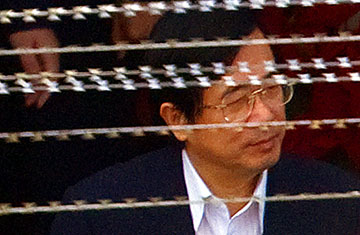
Former Taiwan president Chen Shui-bian leaves for the first day of his trail at the Taipei high court from the Tucheng Detention Centre on March 26, 2009
Taiwan's trial of the century began Thursday as former president Chen Shui-bian showed up to court to face corruption charges that could result in a life sentence. Chen is accused of taking $9 million dollars in personal kickbacks on a state-sanctioned land deal, embezzling over $3 million from a state fund and laundering millions to overseas accounts. Chen has already admitted his wife wired $20 million in leftover campaign funds overseas, but he insists his case is one of political persecution by the new Kuomintang (KMT) administration, which has been forging closer ties with China since coming into power last May.
The nation was watching as Chen, nicknamed the "Son of Taiwan," walked into the courtroom a much thinner man after more than two months in detention. Chen was known during his eight years in office for irritating China with his open support for a greater Taiwanese independence from the mainland. Taiwan's current President Ma Ying-jeou has moved quickly to forge closer economic ties with China since his election last year. Taiwan and China have since opened up tourism, palace museum exchanges, direct charter flights and are planning to discuss further economic agreements this year. (Read TIME's conversation with Ma Ying-jeou.)
After charges against Chen were announced in November, prosecutors detained the former leader, now 58, on grounds that he could collude with other suspects in the case if he remained free. As one of the activists that helped bring democracy to Taiwan in the 1980s, Chen insists that the timing of his detention — shortly after a historic visit from a high-ranking Chinese official to Taiwan — expose that the Taiwan's authorities have been biased against him. While being held at the Taipei Detention Center, Chen has been drawing public attention to his cause through extended hunger strikes, writing poetry, and publishing his memoir. And some, including Chuang Rui-hsiung, a criminal procedure lawyer in Taipei, agree with the former leader's argument. "People should be treated innocent until proven guilty," Chuang says. "They shouldn't treat Chen differently." Chen's loyal supporters also believe that his case has been politicized.
The case, which marks the first time that a former president has been charged with corruption in Taiwan, has been the target of intense media focus in Taiwan for the past several months. The trial has weighed heavily on his wife, son and daughter-in-law, who have all pleaded guilty to money laundering. His wife's trial began last week. Three of an additional 11 suspects in the case have also made confessions in connection with the bribery and embezzlement charges brought against Chen. But Chen himself continues to insist that any funds the family received were political donations, and that the money was wired overseas by his wife without his knowledge.
In some ways, Chen's trial is a positive sign that the justice system is alive in the Chinese world's sole democracy. But as the figurehead of the opposition Democratic Progressive Party (DPP), which was founded to build democracy and fight corruption, his family's scandals have brought the party down, and DPP politicians have tried to distance themselves from the scandal — and the man himself.
Indeed, apart from a few loyal supporters, most of Taiwan remains unconvinced of their former leader's innocence. Civil law expert Chuang Shui-ming says that circumstances surrounding the embezzlement charges make it difficult to believe that the funds in question were only donations. And since several people involved have already admitted to their role in the scandal, Chuang says, "It's hardly possible that the Chen family would be found innocent."
